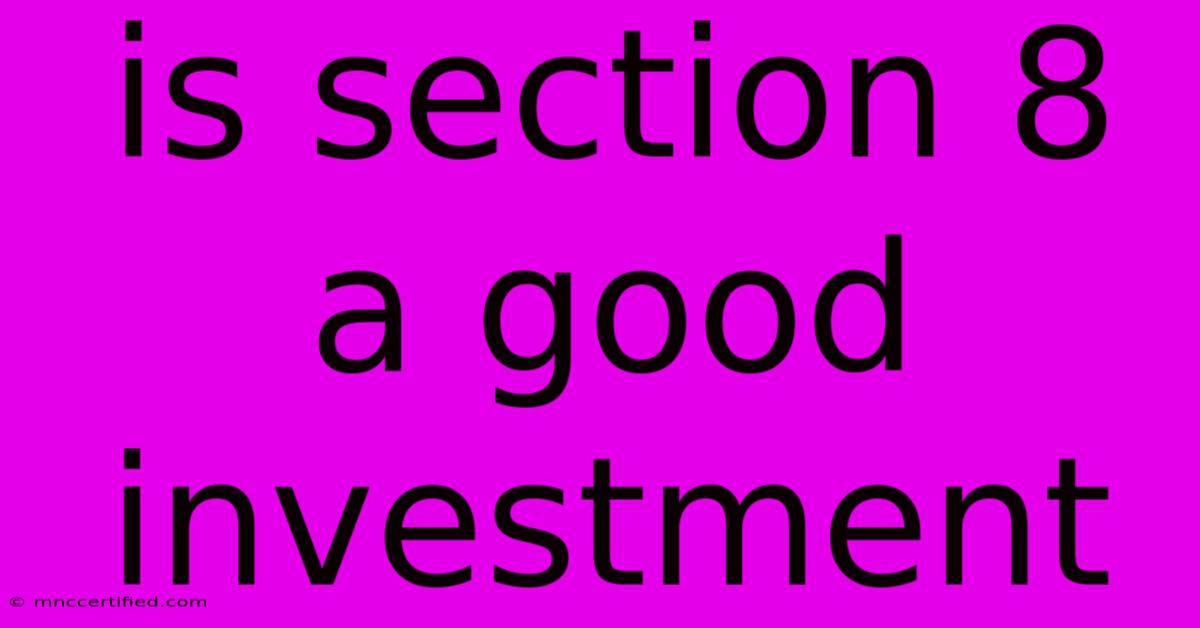Is Section 8 A Good Investment

Table of Contents
Is Section 8 a Good Investment? Weighing the Pros and Cons for Landlords
Investing in real estate can be lucrative, but navigating the complexities of different rental strategies is crucial. One such strategy involves accepting Section 8 tenants, a program administered by the U.S. Department of Housing and Urban Development (HUD). This article explores whether Section 8 is a good investment, examining the advantages and disadvantages to help you make an informed decision.
What is Section 8?
The Section 8 Housing Choice Voucher Program assists low-income families, the elderly, and the disabled in finding affordable housing. Landlords who participate rent their units to Section 8 tenants, receiving a portion of the rent directly from HUD, while the tenant pays the remaining portion. The program aims to provide decent, safe, and sanitary housing, promoting stable communities.
The Alluring Pros of Accepting Section 8 Tenants:
- Guaranteed Rent Payments: This is arguably the biggest draw. HUD directly deposits a significant portion of the rent, minimizing the risk of late or missed payments, a common landlord headache. This predictable income stream provides financial stability.
- Reduced Vacancy Rates: Finding reliable tenants can be challenging. With Section 8, you have a steady flow of pre-qualified applicants, reducing vacancy periods and the associated loss of rental income. This is particularly beneficial in competitive rental markets.
- Government Support and Resources: HUD offers resources and support to landlords, including assistance with tenant screening and conflict resolution. This can significantly ease the administrative burden of property management.
- Positive Social Impact: By participating in Section 8, you're contributing to affordable housing solutions and supporting vulnerable members of the community. This can be a rewarding aspect for socially conscious investors.
The Potential Downsides of Section 8: Increased Complexity and Risk:
- Stricter Regulations and Inspections: Participating in Section 8 requires adherence to HUD's rigorous guidelines regarding property maintenance and tenant screening. Regular inspections are conducted to ensure compliance, adding administrative overhead and potential costs.
- Tenant Screening Challenges: While the program pre-screens tenants, landlords still need to carefully evaluate applications and ensure they meet their criteria. You retain the right to refuse an applicant for legitimate reasons, but must navigate this carefully.
- Potential for Property Damage: While not inherent to Section 8 tenants, the risk of property damage exists with any tenant. However, the robust inspection process might offer some added protection.
- Administrative Burden: Dealing with HUD, submitting paperwork, and coordinating payments requires extra time and effort compared to traditional rentals. This administrative overhead should be factored into your investment calculations.
- Lower Rental Rates: While guaranteed payment is positive, the rent received might be lower than market rate in some instances. Carefully analyze your potential return on investment (ROI) to ensure profitability.
Is Section 8 Right for You? A Thorough Assessment:
Before deciding, consider these key factors:
- Your Risk Tolerance: Are you comfortable with the added administrative burden and the stricter regulations associated with Section 8?
- Market Analysis: Research local rental rates and vacancy rates to determine the potential ROI, considering the lower rental income from Section 8 tenants.
- Property Condition: Ensure your property meets all HUD requirements to avoid costly repairs or rejection from the program.
- Long-Term Goals: Does this investment align with your overall financial strategy and your level of involvement in property management?
Conclusion: A Calculated Decision
The decision of whether or not to accept Section 8 tenants is a complex one requiring careful consideration. While the guaranteed rent payments and reduced vacancy rates offer significant advantages, the administrative burden, stricter regulations, and potential for lower rental income must be weighed carefully. A thorough assessment of your risk tolerance, market analysis, property condition, and long-term investment goals is crucial before taking the leap. If carefully managed, Section 8 can be a viable investment strategy, offering a balance of financial stability and social responsibility. However, it's not a one-size-fits-all solution, and a well-informed decision is paramount to success.

Thank you for visiting our website wich cover about Is Section 8 A Good Investment. We hope the information provided has been useful to you. Feel free to contact us if you have any questions or need further assistance. See you next time and dont miss to bookmark.
Featured Posts
-
Saber Toothed Kitten 35 000 Years Old
Nov 27, 2024
-
Bravo Renews Vanderpump Rules Full Cast Back
Nov 27, 2024
-
Pakistan Triumphs Zimbabwe Odi Highlights
Nov 27, 2024
-
Spotify Wrapped 2024 Date Update
Nov 27, 2024
-
Atlas Travel Insurance Reviews
Nov 27, 2024